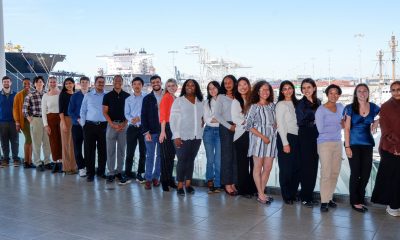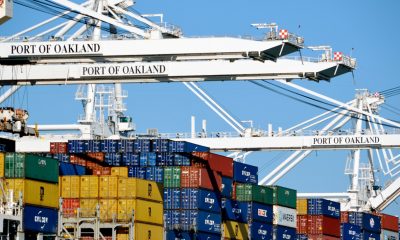Commentary
Posing as a Sports Project – Commentary

One of America’s richest men and an avid Trump supporter, billionaire John Fisher, wants to build 3,000 luxury housing units on the most valuable piece of public land in Oakland, the A’s stadium project, but his proposal has a lot more to do with real estate profits than it does with baseball.
Fisher wants to use the land for condominiums, hotel, and retail development along with a stadium for the A’s. There is much opposition among Oaklanders, and it centers on two problems.
First, the Port of Oakland, where the stadium project is located, is the reason that Oakland is in a better position economically than the old industrial cities of the Midwest. The Port generates 70,000 stable local jobs which, unlike factory jobs, cannot be moved to another country. And because of the historic politics of the local longshore union, many of those good-paying jobs are held by Black workers. Oakland cannot afford to limit its industrial engine because a developer can make a bigger profit from putting high-end condos in the same neighborhood. Furthermore, the new jobs promised by stadium advocates will either be temporary (construction) or low-wage (vendors, clerks and so on).
The demands of wealthy residents, who would inhabit the Fisher project condos, will ultimately overpower the needs of Port industry which can be noisy and dirty 24 hours a day. Decades of urban development have taught us that industrial and residential uses do not mix in the same neighborhood and industry inevitably loses out.
Second, Oakland already has a stadium. It’s in East Oakland, and Oakland families lost their homes to eminent domain fifty years ago when it was built. The Coliseum can be used as it is or it can be redeveloped. That’s what Oaklanders want, as indicated by several polls, and it is, after all, our city.
In answer to this opposition, the Oakland Council mandated a “community benefits” process, meaning that representatives from various groups get together and create a list of things residents might want in exchange for letting Fisher take over their land and build his project. Those serving in this capacity are to be much appreciated.
We do need to consider, however, what is the worth of “community benefits” when, in exchange, we may see maritime job loss, the further gentrification of West Oakland, economic harm to East Oakland, huge increases in traffic and pollution, and the creation of 3,000 housing units that nobody in Oakland can afford to live in. What “benefits” could possibly make up for those losses?
Other cities have done community benefits agreements on projects. Many of those were failures; the items negotiated with the community never happened. The One Hill Project in Pittsburgh and the Atlantic Yards-Pacific Park project in Brooklyn are two examples.
The City Council should vote to a) allow the use of the East Oakland Coliseum land to billionaire Fisher on condition that he actually built a stadium there – not sell his development rights to someone else, and b) reject Fisher’s proposal to take over the Port of Oakland land to build a playground for the rich.
The best thing for us, as a multi-racial working-class city, is 1) To keep the Port humming without Fisher’s interference, while making environmental and equity improvements in Port operations; 2) Refurbish the Coliseum in East Oakland; and 3) Ask some of our Democratic politicians to end their flirtation with major Trump supporter, John Fisher.
Kitty Kelly Epstein, PhD is a professor of education and urban studies, an Oakland resident, the host of Education Today on KPFA; and the author of four books, including her latest “Changing Academia Forever” (2020)
Activism
Oakland Post: Week of December 31, 2025 – January 6, 2026
The printed Weekly Edition of the Oakland Post: Week of – December 31, 2025 – January 6, 2026

To enlarge your view of this issue, use the slider, magnifying glass icon or full page icon in the lower right corner of the browser window.
Activism
Big God Ministry Gives Away Toys in Marin City
Pastor Hall also gave a message of encouragement to the crowd, thanking Jesus for the “best year of their lives.” He asked each of the children what they wanted to be when they grow up.

By Godfrey Lee
Big God Ministries, pastored by David Hall, gave toys to the children in Marin City on Monday, Dec. 15, on the lawn near the corner of Drake Avenue and Donahue Street.
Pastor Hall also gave a message of encouragement to the crowd, thanking Jesus for the “best year of their lives.” He asked each of the children what they wanted to be when they grew up.
Around 75 parents and children were there to receive the presents, which consisted mainly of Gideon Bibles, Cat in the Hat pillows, Barbie dolls, Tonka trucks, and Lego building sets.
A half dozen volunteers from the Big God Ministry, including Donnie Roary, helped to set up the tables for the toy giveaway. The worship music was sung by Ruby Friedman, Keri Carpenter, and Jake Monaghan, who also played the accordion.
Big God Ministries meets on Sundays at 10 a.m. at the Mill Valley Community Center, 180 Camino Alto, Mill Valley, CA Their phone number is (415) 797-2567.
Activism
2025 in Review: Seven Questions for Assemblymember Lori Wilson — Advocate for Equity, the Environment, and More
Her rise has also included several historic firsts: she is the only Black woman ever appointed to lead the influential Assembly Transportation Committee, and the first freshman legislator elected Chair of the California Legislative Black Caucus. She has also been a vocal advocate for vulnerable communities, becoming the first California legislator to publicly discuss being the parent of a transgender child — an act of visibility that has helped advanced representation at a time when political tensions related to social issues and culture have intensified.

By Edward Henderson, California Black Media
Assemblymember Lori D. Wilson (D-Suisun City) joined the California Legislature in 2022 after making history as Solano County’s first Black female mayor, bringing with her a track record of fiscal discipline, community investment, and inclusive leadership.
She represents the state’s 11th Assembly District, which spans Solano County and portions of Contra Costa and Sacramento Counties.
Her rise has also included several historic firsts: she is the only Black woman ever appointed to lead the influential Assembly Transportation Committee, and the first freshman legislator elected Chair of the California Legislative Black Caucus. She has also been a vocal advocate for vulnerable communities, becoming the first California legislator to publicly discuss being the parent of a transgender child — an act of visibility that has helped advanced representation at a time when political tensions related to social issues and culture have intensified.
California Black Media spoke with Wilson about her successes and disappointments this year and her outlook for 2026.
What stands out as your most important achievement this year?
Getting SB 237 passed in the Assembly. I had the opportunity to co-lead a diverse workgroup of colleagues, spanning a wide range of ideological perspectives on environmental issues.
How did your leadership contribute to improving the lives of Black Californians this year?
The Black Caucus concentrated on the Road to Repair package and prioritized passing a crucial bill that remained incomplete during my time as chair, which establishes a process for identifying descendants of enslaved people for benefit eligibility.
What frustrated you the most this year?
The lack of progress made on getting Prop 4 funds allocated to socially disadvantaged farmers. This delay has real consequences. These farmers have been waiting for essential support that was promised. Watching the process stall, despite the clear need and clear intent of the voters, has been deeply frustrating and reinforces how much work remains to make our systems more responsive and equitable.
What inspired you the most this year?
The resilience of Californians persists despite the unprecedented attacks from the federal government. Watching people stay engaged, hopeful, and determined reminded me why this work matters and why we must continue to protect the rights of every community in our state.
What is one lesson you learned this year that will inform your decision-making next year?
As a legislator, I have the authority to demand answers to my questions — and accept nothing less. That clarity has strengthened my approach to oversight and accountability.
In one word, what is the biggest challenge Black Californians are facing currently?
Affordability and access to quality educational opportunities.
What is the goal you want to achieve most in 2026?
Advance my legislative agenda despite a complex budget environment. The needs across our communities are real, and even in a tight fiscal year, I’m committed to moving forward policies that strengthen safety, expand opportunity, and improve quality of life for the people I represent.
-

 Bay Area3 weeks ago
Bay Area3 weeks agoPost Salon to Discuss Proposal to Bring Costco to Oakland Community meeting to be held at City Hall, Thursday, Dec. 18
-

 Activism3 weeks ago
Activism3 weeks agoMayor Lee, City Leaders Announce $334 Million Bond Sale for Affordable Housing, Roads, Park Renovations, Libraries and Senior Centers
-

 Activism3 weeks ago
Activism3 weeks agoOakland Post: Week of December 10 – 16, 2025
-

 Activism3 weeks ago
Activism3 weeks agoOakland School Board Grapples with Potential $100 Million Shortfall Next Year
-

 Arts and Culture3 weeks ago
Arts and Culture3 weeks agoFayeth Gardens Holds 3rd Annual Kwanzaa Celebration at Hayward City Hall on Dec. 28
-

 Activism3 weeks ago
Activism3 weeks ago2025 in Review: Seven Questions for Black Women’s Think Tank Founder Kellie Todd Griffin
-

 Advice3 weeks ago
Advice3 weeks agoCOMMENTARY: If You Don’t Want Your ‘Black Card’ Revoked, Watch What You Bring to Holiday Dinners
-

 Activism3 weeks ago
Activism3 weeks agoAnn Lowe: The Quiet Genius of American Couture


























































